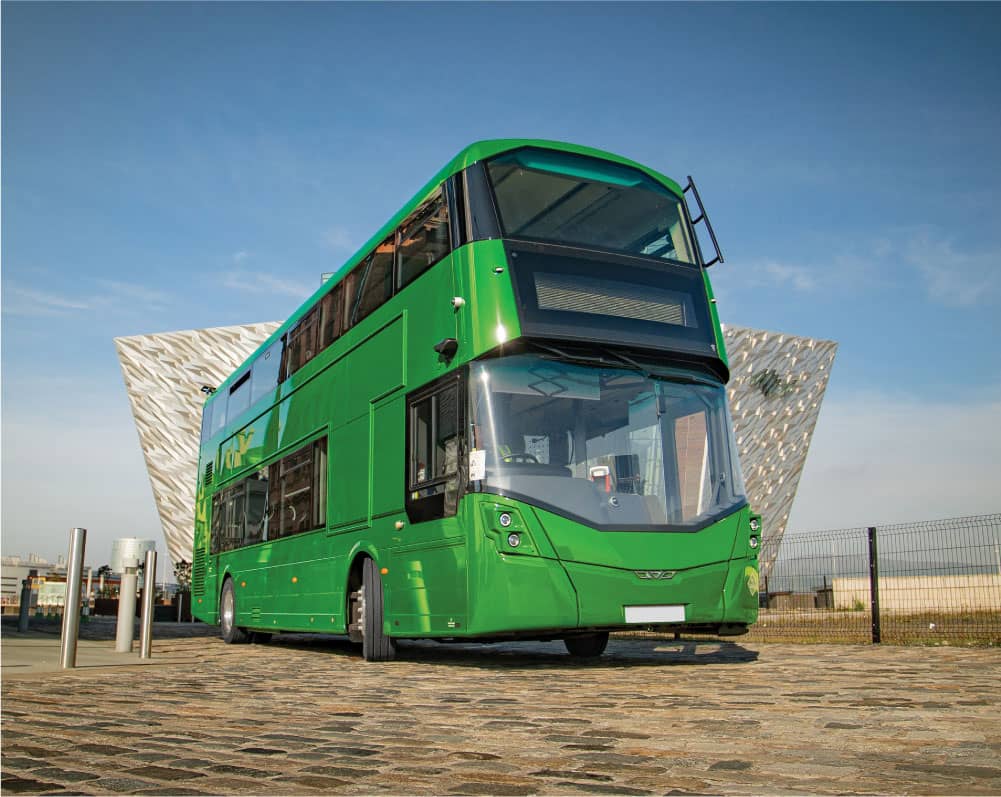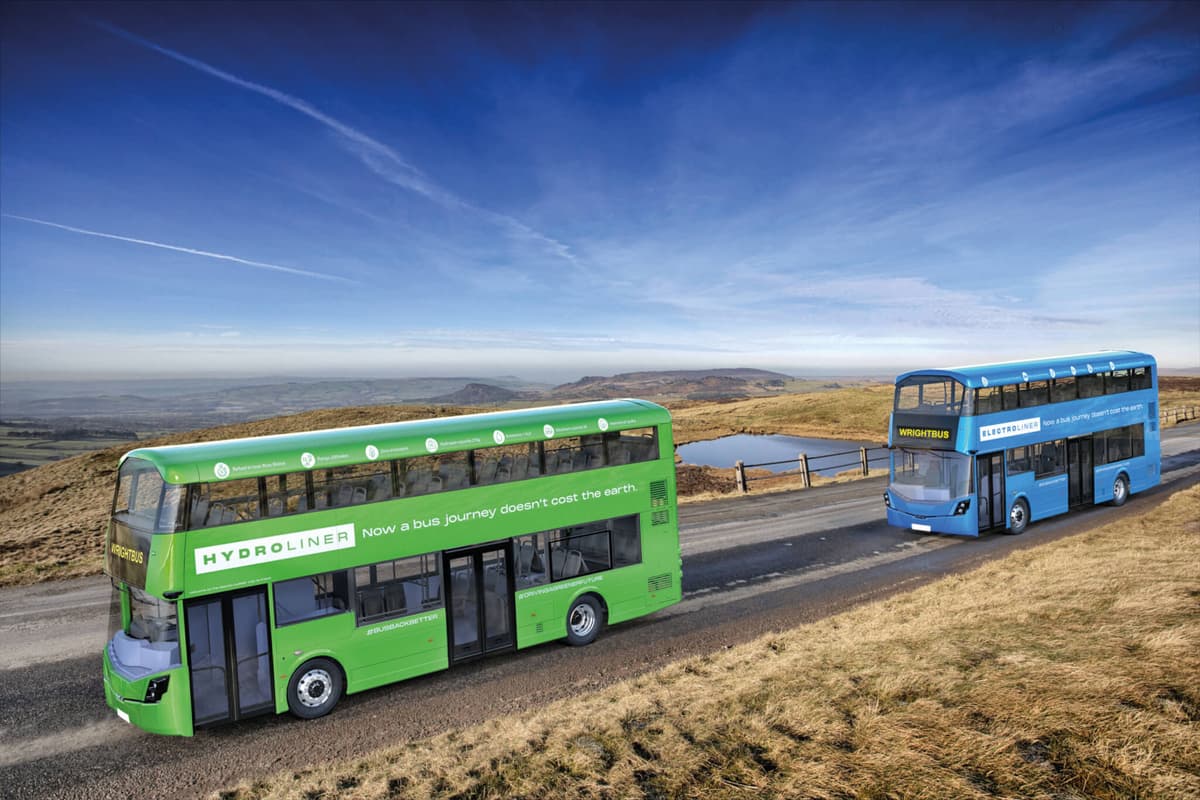
In the battle against climate change, we need creative solutions for every industry, including transportation. Ballard Power Systems, an expert in clean energy fuel cell technology worldwide, is teaming up with Wrightbus, an innovative bus maker from the UK. Together they are working to introduce hydrogen-powered buses throughout the UK and Europe to make public transport more eco-friendly.

RELATED: Ballard Announces Orders for 70 Hydrogen Fuel Cell Engines for Delivery to Wrightbus in 2024
A Clean Collaboration for a Greener Future
Ballard's recent news about an order of 70 units for its FCmove®-HD hydrogen fuel cell engines by Wrightbus is a significant advancement in eco-friendly public transportation. These engines will be used to power both single- and double-decker buses set to be on the roads by 2025. This partnership reinforces the strong bond between the two companies, showcasing the increasing need for hydrogen fuel cell technology in European transit networks.
"We are pleased to strengthen our relationship with Wrightbus and support their deployment of an increasing volume of hydrogen-powered transit buses across the UK and Europe," said Oben Uluc, Vice President, Sales & Marketing, EMEA. "We are seeing broader market acceptance of fuel cell buses by European transit operators seeking to decarbonize their operations with a technology approach that enables long range, fast refueling, and scalable refueling infrastructure."
Hydrogen fuel cell buses have a significant environmental impact as they produce zero emissions during operation, reducing greenhouse gas emissions and promoting cleaner air, particularly in urban areas. This supports the ambitious decarbonization objectives of both the UK and the European Union.

>> In Other News: Carbon Clean Achieves Fabrication Milestone on Flagshipone With the Project’s First Carbon Capture Unit Module
Hydrogen Fuel Cell Buses: A Breath of Fresh Air for Cities
Hydrogen fuel cell engines offer multiple benefits to public transport. They have a long operating range, enabling buses to run for extended periods without needing refueling. Additionally, their refueling process is much quicker than that of electric battery buses, reducing downtime and enhancing operational effectiveness.
Hydrogen fuel cell technology not only benefits the vehicles but also supports building a flexible refueling system. As more hydrogen-powered buses hit the roads, it's essential to have a strong network of refueling stations in place. The use of fuel cell technology makes it more feasible to develop this network because it allows for quicker refueling compared to batteries.
Case in Point: Success Stories of Hydrogen Power
Hydrogen-powered public transport is making a positive impact in many cities worldwide. For instance, Aberdeen in Scotland has the largest fleet of hydrogen double-decker buses in Europe. This shows that this technology works well in real life*. These buses produce much fewer emissions than traditional diesel ones, resulting in cleaner air and a healthier environment for people.*
The Long Road Ahead: Advantages for a Sustainable Future
Ballard's expertise in hydrogen fuel cell technology makes them an important contributor to transitioning towards eco-friendly transportation. This technology has clear environmental advantages that can significantly cut down emissions and enhance air quality.
Additionally, the extended operating range and quicker refueling times of fuel cell buses make them an attractive option for transit operators looking for effective sustainable solutions. The future of public transport across the UK and Europe is clearly focused on being environmentally friendly_. Collaborations such as that between Ballard and Wrightbus show great potential for using hydrogen fuel cell technology to meet ambitious decarbonization targets while promoting a cleaner, healthier future._
Subscribe to the newsletter
Daily decarbonization data and news delivered to your inbox
Follow the money flow of climate, technology, and energy investments to uncover new opportunities and jobs.
Latest issues
-
This $4.1M Deal Could Change Carbon Capture's Playbook
Inside This Issue 🗜️ CarbonQuest Lands $4.1M Alberta Deal on Gas Compressors 🛡️ CADO, 123Carbon, and Assure SAF Registry Join Forces to Tackle SAF Integrity Gaps ✈️ ISCC, OMV, and Airbus Partner t...
-
Can Koloma Crack Iowa's Billion-Year-Old Secret?
Inside This Issue ⛏️ Iowa's Hydrogen Rush: Can Koloma Strike Gold Before Rules Kick In? ✈️ Bentley Commits to Use 100% Sustainable Aviation Fuel for Car Airfreight 🌬️ Minister Parrott Provides Upd...
-
$47M Just Poured Into This SAF Producer
Inside This Issue 💰 LanzaJet Announces $47M in New Capital and First Close of Equity Round at $650M Pre-Money Valuation 🚢 Maersk's Ethanol Bet Could Reshape U.S. Fuel Markets 🪨 Canada Nickel and t...
Company Announcements
-
Feedstocks are Perennial Grasses and other Renewable Biomass Sources FREDERICK, Md., Feb. 18, 2026 /PRNewswire/ -- Do you know why passenger and freight planes are not using renewable biofuel? It'...
-
Vancouver, British Columbia--(Newsfile Corp. - February 25, 2026) - Q Precious & Battery Metals Corp. (CSE: QMET) (OTC Pink: BTKRF) (FSE: 0NB) ("QMET" or the "Company") congratulates Quebec Inn...
-
Carbon Direct and C2X Announce Collaboration on Pioneering Forestry Residue-to-Biofuel Project
Collaboration on C2X’s Beaver Lake Biofuels project advances biomass carbon removal and storage as a scalable climate solution, transforming Louisiana’s forestry and sawmill residues into biofuel a...
-
Carbon Direct and C2X Announce Collaboration on Pioneering Forestry Residue-to-Biofuel Project
Collaboration on C2X’s Beaver Lake Biofuels project advances biomass carbon removal and storage as a scalable climate solution, transforming Louisiana’s forestry and sawmill residues into biofuel a...